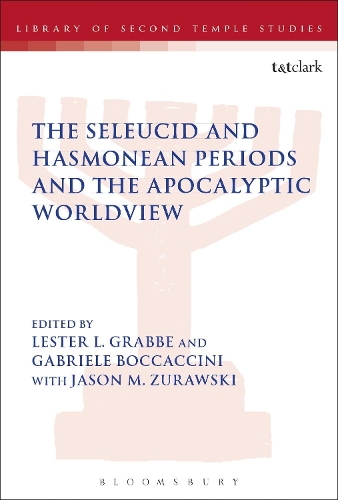
The Seleucid and Hasmonean Periods and the Apocalyptic Worldview
(Hardback)
Available Formats
Publishing Details
The Seleucid and Hasmonean Periods and the Apocalyptic Worldview
By (Author) Dr. Lester L. Grabbe
Edited by Gabriele Boccaccini
Edited by Jason M. Zurawski
Bloomsbury Publishing PLC
T.& T.Clark Ltd
25th February 2016
United Kingdom
Classifications
Tertiary Education
Non Fiction
Criticism and exegesis of sacred texts
Middle Eastern history
Ancient history
221.046
Physical Properties
Hardback
336
Width 156mm, Height 234mm
558g
Description
This tightly focused collection of essays, from an invited seminar of international specialists, centres on the question of the apocalyptic worldview around the time of the Maccabean revolt. What was the nature of apocalyptic at this time Did the Maccabees themselves have a distinct apocalyptic worldview These questions lead to other, more specific queries: who of the various groups held such a view Certain of the essays analyse the characteristics of the apocalypses and related literature in this period, and whether the apocalyptic worldview itself gave rise to historical events or, at least, influenced them. The collection begins with two introductory essays. Both the main and short papers have individual responses, and two considered responses by well-known experts address the entire collection. The volume finishes with a concluding chapter by the lead editor that gives a perspective on the main themes and conclusions arising from the papers and discussion.
Reviews
There is a high level of interaction between the papers, resulting in nuanced discussion of several key issues A clear guide to the state of several interlocking discussions, and provides useful focus concerning some rather underdetermined issues. * Journal for the Study of the Old Testament *
A true gem by virtue of the fact that it does not only present cogent and thought-provoking contributions but also responses to these essays. Thereby, one gets an impression of the very vivacious and productive atmosphere in which these discussions evolved. At the same time, the combination of chapters and responses provides an important glimpse into a scholarly field in which criticism of ideas is a prerequisite for continuous progress. * Journal for the Study of Judaism *
Author Bio
Lester L. Grabbe is Professor Emeritus of Hebrew Bible and Early Judaism at the University of Hull, UK, as well as being series editor of the Library of Second Temple Studies. Gabriele Boccaccini is Professor of Second Temple Judaism and Early Rabbinic Literature at the University of Michigan, USA. Jason M. Zurawski is a PhD candidate in Second Temple Judaism at the University of Michigan, USA.
